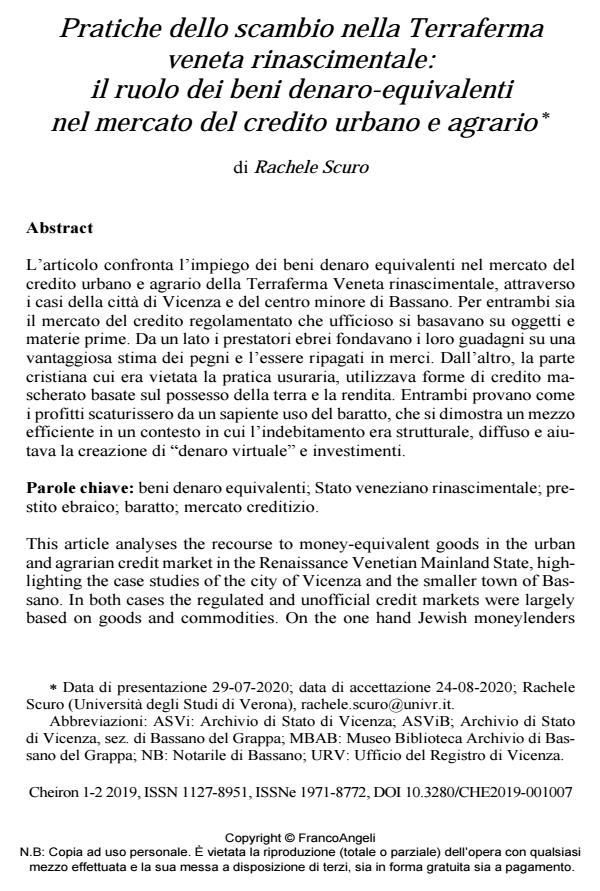Pratiche dello scambio nella Terraferma veneta rinascimentale: il ruolo dei beni denaro-equivalenti nel mercato del credito urbano e agrario
Journal title CHEIRON
Author/s Rachele Scuro
Publishing Year 2021 Issue 2019/1-2
Language Italian Pages 25 P. 142-166 File size 236 KB
DOI 10.3280/CHE2019-001007
DOI is like a bar code for intellectual property: to have more infomation
click here
Below, you can see the article first page
If you want to buy this article in PDF format, you can do it, following the instructions to buy download credits

FrancoAngeli is member of Publishers International Linking Association, Inc (PILA), a not-for-profit association which run the CrossRef service enabling links to and from online scholarly content.
This article analyses the recourse to money-equivalent goods in the ur-ban and agrarian credit market in the Renaissance Venetian Mainland State, highlighting the case studies of the city of Vicenza and the smaller town of Bassano. In both cases the regulated and unofficial credit markets were largely based on goods and commodities. On the one hand Jewish moneylenders grounded their business on a profitable assessment of pledges and the opportunity to be repaid in wares. On the other hand, Christians practiced hidden forms of usury based on land-owning and farm incomes. The two thus based their gains on a skilful use of barter, that proved to be an efficient economic tool in a context in which indebtedness was intrinsic, largely spread and helped the creation of "virtual money" and investments.
Keywords: Money-equivalent goods; Renaissance Venetian State; Jewish moneylending; Barter; Credit market.
- Mezzi di scambio non monetari. Merci e servizi come monete alternative nelle economie dei secoli XIII-XVIII / Alternative currencies. Commodities and services as exchange currencies in the monetarized economies of the 13th to 18th centuries Rachele Scuro, pp.357 (ISBN:979-12-215-0347-0)
- Grain trade in Early modern Mantua and Venice: The role of Ashkenazi and Italian Jews Marina Romani, Rachele Scuro, in Business History /2024 pp.551
DOI: 10.1080/00076791.2022.2103543
Rachele Scuro, Pratiche dello scambio nella Terraferma veneta rinascimentale: il ruolo dei beni denaro-equivalenti nel mercato del credito urbano e agrario in "CHEIRON" 1-2/2019, pp 142-166, DOI: 10.3280/CHE2019-001007